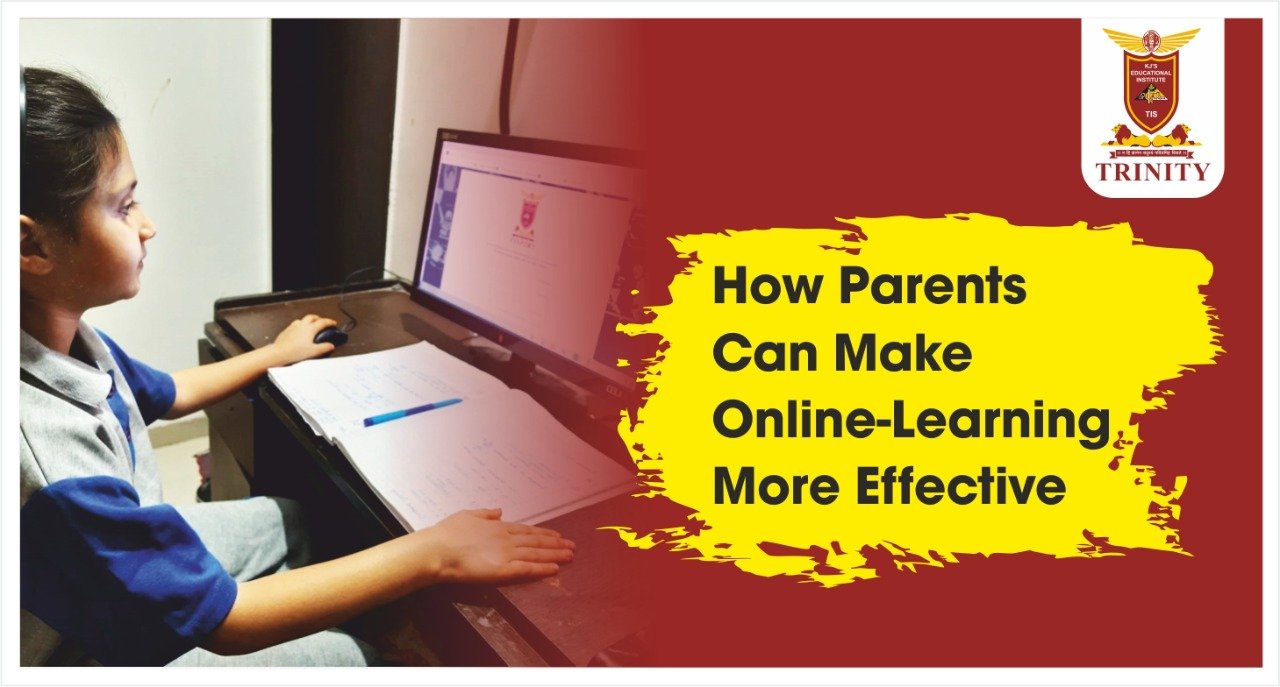
4 Ways on How Parents Can Make Online-Learning More Effective
admin@trinityinternationalschool
May 18, 2023

We are glad to share with you that Trinity International School has been recognized as the best CBSE School In Pune and awarded with 𝐁𝐫𝐢𝐭𝐢𝐬𝐡 𝐂𝐨𝐮𝐧𝐜𝐢𝐥’𝐬 𝐈𝐧𝐭𝐞𝐫𝐧𝐚𝐭𝐢𝐨𝐧𝐚𝐥 𝐒𝐜𝐡𝐨𝐨𝐥 𝐀𝐰𝐚𝐫𝐝, ranked top- 𝐑𝐚𝐧𝐤𝐞𝐝 #𝟏 𝐢𝐧 𝐆𝐫𝐞𝐞𝐧 𝐂𝐚𝐦𝐩𝐮𝐬, 𝐑𝐚𝐧𝐤𝐞𝐝 #𝟒 𝐢𝐧 𝐍𝐚𝐭𝐢𝐨𝐧𝐚𝐥 𝐂𝐮𝐫𝐫𝐢𝐜𝐮𝐥𝐮𝐦, 𝐑𝐚𝐧𝐤𝐞𝐝 #𝟏 𝐢𝐧 𝐄𝐱𝐜𝐞𝐥𝐥𝐞𝐧𝐜𝐞 𝐢𝐧 𝐎𝐧𝐥𝐢𝐧𝐞 𝐂𝐥𝐚𝐬𝐬𝐞𝐬 𝐂𝐮𝐫𝐫𝐢𝐜𝐮𝐥𝐮𝐦,𝐑𝐚𝐧𝐤𝐞𝐝 #𝟏 𝐚𝐬 𝐭𝐡𝐞 𝐁𝐞𝐬𝐭 𝐒𝐜𝐡𝐨𝐨𝐥 𝐢𝐧 𝐄𝐯𝐚𝐥𝐮𝐚𝐭𝐢𝐨𝐧 𝐏𝐫𝐨𝐜𝐞𝐬𝐬, 𝐑𝐚𝐧𝐤𝐞𝐝 #𝟏 𝐢𝐧 𝐆𝐥𝐨𝐛𝐚𝐥 𝐂𝐨𝐥𝐥𝐚𝐛𝐨𝐫𝐚𝐭𝐢𝐯𝐞 𝐋𝐞𝐚𝐫𝐧𝐢𝐧𝐠.
As we have entered into a new era where social isolation has become the norm, making the switch to online learning can keep students engaged in academics even when brick-and-mortar schools are forced to close.
Beyond providing a solution to ensure students keep up with the curriculum, implementing e-learning can also provide important structure in students’ days at home and maintain a sense of (at least some) normalcy. But, flourishing during e-learning days—especially when they need to be implemented for any kind of extended period—requires educators, students, and families to adapt to new routines. Parents and caregivers can offer some of the most valuable guidance students need to find the right online learning methods, remain accountable for their work, and get extra help when needed.
Here are four ways parents can do to help their child be successful while learning online:.
1. Build a Schedule- Traditional school days give students a lot of structure and this is hard to replicate during e-learning days. For some students, the flexibility of learning online is a natural fit. However, for other students, particularly young learners, managing this increased autonomy is a challenge. Students engaging in online learning need to build their routines and efficiently manage their time to stay on track. Having a well-thought-out, specific daily schedule is key, and parents can be a huge help not only in building such a plan but also in making sure that it is followed properly.
2. Model Hard Work and Persistence Learning online from home removes many of the systems of responsibility that students are used to in the traditional classroom—achieving the same level of success will likely take a greater level of essential motivation and self-directed effort. Just like time management skills, this motivation comes more naturally for some students than for others. Despite, acclimating to virtual learning platforms, getting accustomed to self-pacing, and working through the normal, productive struggles of learning more independently can be challenging. Parents can make a big difference simply by demonstrating the ubiquity and importance of these skills in the real world beyond school.
3. Stay in Touch with Teachers Just because children are learning online doesn’t mean they are learning independently! Teachers still play a critical role during online learning—and maintaining open, frequent communication is key to their success. Parents need to take part in this ongoing dialogue to make sure students stay on-pace and get the appropriate help when it’s needed.
4. Encourage Interaction with Peers It may be tempting to insist that your kids be offline during their breaks, but that is not necessarily the best rule. One of the things kids miss the most from their regular school day is the opportunity to interact socially with classmates. Since they are at home, let them do that by calling their friends and classmates and interact with them through social media. Give them a chance to join with peers during their breaks, like they would during lunch at school.
And most importantly stay in touch with teachers and other parents to work through it together. Don’t be afraid to ask for help..
Recent Post



